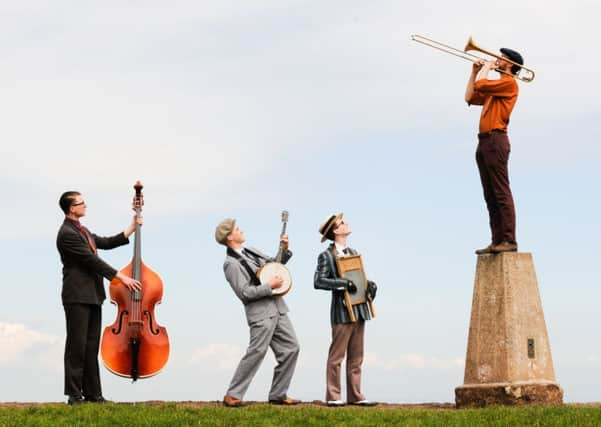Lost Jelly Roll tunes for Edinburgh Jazz Festival


When Jelly Roll Morton – jazz pianist, composer and bandleader – arrived in Los Angeles at the close of the 1930s, he was a sick man, his asthma compounded by stab wounds he received in a club brawl some years earlier. He hoped California’s climate might ease his respiratory problems, but he was also desperate to revive his career, which had been flagging badly since the early 1930s when, as the record industry wrestled with the Great Depression, his contract with the Victor label was terminated.
New Orleans-born Morton had been writing arrangements of his material for an envisaged big-band line-up. Too ill to play, however, he employed Buster Wilson, pianist with Kid Ory’s band, as musical director of his band. Morton died, however, in July 1941, and the scores mouldered in a trunk in Wilson’s home. After Wilson died of pneumonia in 1949, the scores were largely dispersed and many arrangements remained unheard. Until now, that is. On 23 July, as part of the Edinburgh Jazz and Blues Festival, the Ken Mathieson Classic Jazz Orchestra (CJO) will perform some of these “lost charts”, along with distinguished New Orleans guests clarinettist Evan Christopher, trumpeter Duke Heitger and guitarist Don Vappie. The CJO was formed ten years ago specifically to stage a concert of Morton’s music for the festival. This month’s show, along with a new album, celebrates the band’s tenth anniversary.
Advertisement
Hide AdAmid a festival spanning every genre of jazz, a celebration of Morton may be seen as a “back to basics” gesture – “but not as far back as people tend to think,” says drummer Mathieson. “Jelly’s name is indelibly associated with the 1920s but the stuff we’re doing was written just before he died and represents his take on late Swing Era big band music.”
Morton is sometimes referred to as the father of jazz, although clearly the beginnings of jazz can’t be attributed to any individual. “Without question, however, he was the first important composer in the history of jazz,” says Mathieson, “and a very important figure in the transition from ragtime to jazz.”
But to get back to that trunk in Buster Wilson’s bedroom, after his death, Mathieson explains, sundry collectors started calling and making off with charts until William Russell, a pianist and jazz historian fascinated by Morton’s music, visited Wilson’s widow and took the remaining scores back to New Orleans. After Russell’s death in 1992, his chaotic collections went to the Historic New Orleans Collection (HNOC) archive, which set about cataloguing everything, including the Morton scores – no mean feat, as Mathieson explains: “You’d get parts for, say, Mamie’s Blues, with first, second and third trumpet parts in one lot, then 40 lots later you’d come across two trombone parts.”
Mathieson had been in touch with HNOC over the Morton material and from their collection, as well as other, printed collections, he sourced some of these virtually unknown compositions. “The band played a few of them – the pseudo-oriental Ganjam and another called Stop and Go – at the last Edinburgh Jazz Festival, but as reductions, in my settings. This year we’ll play them in Morton’s settings. I’m still doing the copying and I’ve made spaces for soloists because we’ll have Evan again, and Duke Heitger and Don Vappie.”
For the concert’s second half, featuring Morton’s restored big-band arrangements, the band will play in a greatly augmented form. The concert also launches the CJO’s new album with Evan Christopher, a celebrated New Orleans Creole stylist, titled Clarinet Gumbo (Lake Records), funded by Creative Scotland and the National Lottery, and available soon.
The festival opens on Friday with a Mandela Day concert with South African pianist Abdullah Ibrahim. The programme ranges through such diverse genres as the Great American Songbook, interpreted by Iain Hunter, Todd Gordon and James Tormé; Harlem stride piano from Stephanie Trick; the jazz-rock fusion of guitarist Mike Stern with saxophonist Bill Evans; blues guitarist Otis Taylor; gypsy jazz from Fapy Lafertin; and maverick piano trio The Bad Plus.
Advertisement
Hide AdSome of Scottish jazz’s finest, including pianist Brian Kellock, join two former members of the Oscar Peterson Trio to play the late, great Canadian jazzman’s work along with the Commonwealth Big Band, while elsewhere are Julian Arguelles, Bill Kyle’s Back to Basics Quartet and Phil Bancroft. And Colin Steele and Dave Milligan team up again with Sardinian saxophonist Enzo Favata.
Stretching the jazz credentials but guaranteeing bums on seats are Celtic R&B legend Van Morrison and Jools Holland’s Rhythm & Blues Orchestra with ex-Spice Girl Melanie C.
Advertisement
Hide AdAlso cropping up is a lesser known but enthuastically youthful outfit, the Gramophone Jass Band (utilising an early alternative spelling of “jazz”). I caught some of them performing on Calton Hill at the festival programme launch, sporting natty period threads. Playing the music of the New Orleans speakeasies, its members’ ages range from 20 to 25, quite an anomaly in traditional jazz circles where the demographic tends towards the mature side.
The Gramophone boys sound as if they’ve never listened to a pop chart hit in their lives, instead immersing themselves in the music of Satchmo, King Oliver and Django Reinhardt. I asked singer-guitarist Ollie Margerison, 22, whether their peers regard them as cool or simply eccentric. “I think a mix of the two, to be honest,” he replies. “To some hip people it’s quite cool, quite rebellious in a way, but modern chart music fanatics don’t really understand it.”
Significantly, their gigs attract young audiences – “people are quite attracted by the speakeasy thing. But it’s always nice to revive something that could be lost.”
Ever the sharp dresser, Jelly Roll Morton might just have agreed.
Ken Mathieson’s Classic Jazz Orchestra is at the Queen’s Hall, 23 July. The Edinburgh Jazz & Blues Festival runs from 18-27 July. For further details see www.edinburghjazzfestival.com and www.classicjazzorchestra.org.uk